2019年最新年新 人教版高二英语第二学期期末评价试题
2019年最新年新 人教版高二英语第二学期期末考试试题
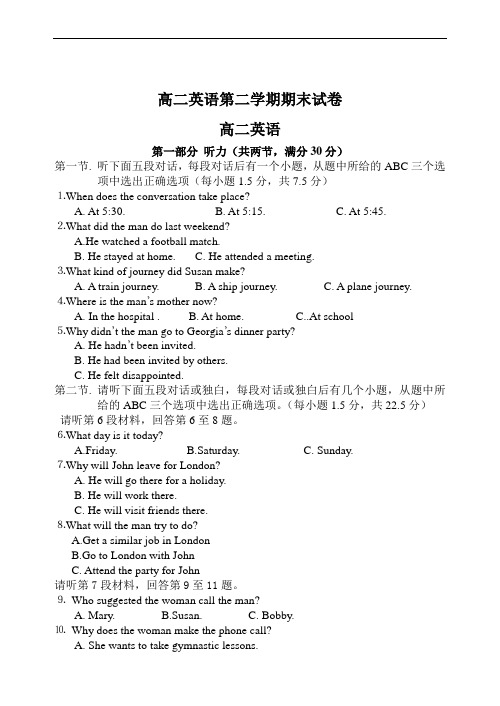
高二英语第二学期期末试卷高二英语第一部分听力(共两节,满分30分)第一节.听下面五段对话,每段对话后有一个小题,从题中所给的ABC三个选项中选出正确选项(每小题1.5分,共7.5分)⒈When does the conversation take place?A. At 5:30.B. At 5:15.C. At 5:45.⒉What did the man do last weekend?A.He watched a football match.B. He stayed at home.C. He attended a meeting.⒊What kind of journey did Susan make?A. A train journey.B. A ship journey.C. A plane journey.⒋Where is the man’s mother now?A. In the hospital .B. At home.C..At school⒌Why didn’t the man go to Georgia’s dinner party?A. He hadn’t been invited.B. He had been invited by others.C. He felt disappointed.第二节.请听下面五段对话或独白,每段对话或独白后有几个小题,从题中所给的ABC三个选项中选出正确选项。
(每小题1.5分,共22.5分)请听第6段材料,回答第6至8题。
⒍What day is it today?A.Friday.B.Saturday.C. Sunday.⒎Why will John leave for London?A. He will go there for a holiday.B. He will work there.C. He will visit friends there.⒏What will the man try to do?A.Get a similar job in LondonB.Go to London with JohnC. Attend the party for John请听第7段材料,回答第9至11题。
2019年最新年新人教版高二年级英语下学期期末考试试卷
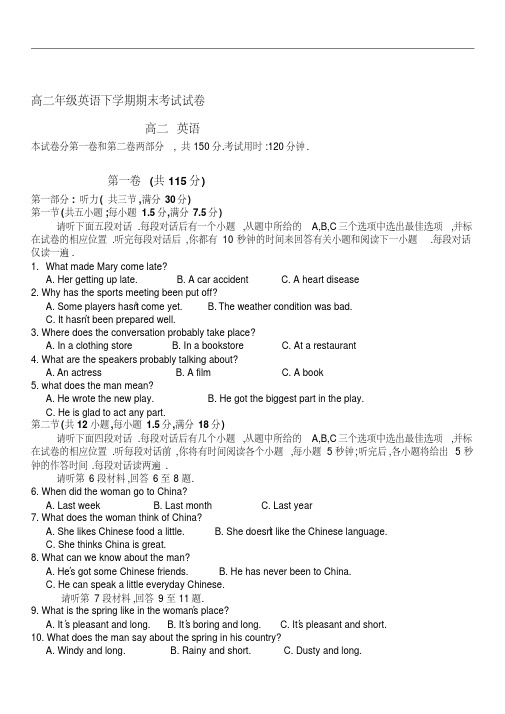
高二年级英语下学期期末考试试卷高二英语本试卷分第一卷和第二卷两部分, 共150分.考试用时:120分钟.第一卷(共115分)第一部分: 听力( 共三节,满分30分)第一节(共五小题;每小题1.5分,满分7.5分)请听下面五段对话.每段对话后有一个小题,从题中所给的A,B,C三个选项中选出最佳选项,并标在试卷的相应位置.听完每段对话后,你都有10秒钟的时间来回答有关小题和阅读下一小题.每段对话仅读一遍.1.What made Mary come late?A. Her getting up late.B. A car accidentC. A heart disease2. Why has the sports meeting been put off?A. Some players hasn’t come yet.B.The weather condition was bad.C. It hasn’t been prepared well.3. Where does the conversation probably take place?A. In a clothing storeB. In a bookstoreC. At a restaurant4. What are the speakers probably talking about?A.An actressB. A filmC. A book5. what does the man mean?A. He wrote the new play.B. He got the biggest part in the play.C. He is glad to act any part.第二节(共12小题,每小题1.5分,满分18分)请听下面四段对话.每段对话后有几个小题,从题中所给的A,B,C三个选项中选出最佳选项,并标在试卷的相应位置.听每段对话前,你将有时间阅读各个小题,每小题5秒钟;听完后,各小题将给出5秒钟的作答时间.每段对话读两遍.请听第6段材料,回答6至8题.6. When did the woman go to China?A. Last weekB. Last monthC. Last year7. What does the woman think of China?A. She likes Chinese food a little.B. She doesn’t like the Chinese language.C. She thinks China is great.8. What can we know about the man?A. He’s got some Chinese friends.B. He has never been to China.C. He can speak a little everyday Chinese.请听第7段材料,回答9至11题.9. What is the spring like in the woman’s place?A. It’s pleasant and long.B. It’s boring and long.C. It’s pleasant and short.10. What does the man say about the spring in his country?A. Windy and long.B. Rainy and short.C. Dusty and long.。
2019年最新年新 人教版高二英语下册期末考试题
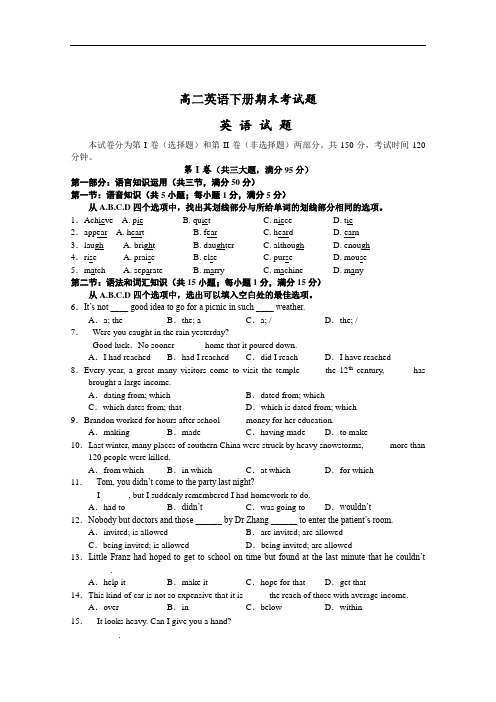
高二英语下册期末考试题英语试题本试卷分为第I卷(选择题)和第II卷(非选择题)两部分。
共150分,考试时间120分钟。
第I卷(共三大题,满分95分)第一部分:语言知识运用(共三节,满分50分)第一节:语音知识(共5小题;每小题1分,满分5分)从A.B.C.D四个选项中,找出其划线部分与所给单词的划线部分相同的选项。
1.Achieve A. pie B. quiet C. niece D. tie2.appear A. heart B. fear C. heard D. earn3.laugh A. bright B. daughter C. although D. enough4.rise A. praise B. else C. purse D. mouse5.match A. separate B. marry C. machine D. many第二节:语法和词汇知识(共15小题;每小题1分,满分15分)从A.B.C.D四个选项中,选出可以填入空白处的最佳选项。
6.It‟s not ____ good idea to go for a picnic in such ____ weather.A.a; the B.the; a C.a; / D.the; /7.---Were you caught in the rain yesterday?---Good luck.No sooner ______ home that it poured down.A.I had reached B.had I reached C.did I reach D.I have reached 8.Every year, a great many visitors come to visit the temple_____ the 12th century, _____ has brought a large income.A.dating from; which B.dated from; whichC.which dates from; that D.which is dated from; which9.Brandon worked for hours after school _____ money for her education.A.making B.made C.having made D.to make10.Last winter, many places of southern China were struck by heavy snowstorms, _____ more than 120 people were killed.A.from which B.in which C.at which D.for which11.---Tom, you didn‟t come to the party last night?---I ______, but I suddenly remembered I had homework to do.A.had to B.didn‟t C.was going to D.wouldn‟t 12.Nobody but doctors and those ______ by Dr Zhang ______ to enter the patient‟s room.A.invited; is allowed B.are invited; are allowedC.being invited; is allowed D.being invited; are allowed13.Little Franz had hoped to get to school on time but found at the last minute that he couldn‟t _____.A.help it B.make it C.hope for that D.get that14.This kind of car is not so expensive that it is _____ the reach of those with average income.A.over B.in C.below D.within15.---It looks heavy. Can I give you a hand?---_______.A. No, thanksB. Yes, my pleasureC. No, never mindD. Yes, I do16.---I hope you‟re enjoying your stay here.---If it ______ for the climate, I would like it here very much.A.isn‟t B.hasn‟t been C.weren‟t D.hadn‟t been17.It is said that the thief was fined five times _____ that he should have paid.A.as more money as B.as much money thanC.much money than D.the amount of money18.---Did you call on any of your old friends when you returned to your hometown?---_____ of them.They were all very busy.A.None B.Nobody C.Both D.Neither19.Don‟t leave the water ______ while you wash the dishes.A.run B.running C.being run D.to run20 ---What do you expect your son to succeed in?---_____ the entrance exam.A.To pass B.Past the exam C.Get past D.Passing第三节:完形填空(共20小题;每小题1.5分,满分30分)Why did I come today? I wondered. My Christmas 21 contained several people that claimed they wanted nothing but I knew their feelings would be hurt 22 I didn‟t buy them anything, so buying gifts was 23 but fun.Hurriedly, I finished shopping and 24 the long checkout lines. In front of me were a boy of about 5 and a younger girl. She carried a beautiful pair of 25 slippers. When we finally 26 the checkout register, the girl 27 placed the shoes on the counter. She treated them as though they were a 28 .……That will be $6.09,‟‟ the cashier said. The boy 29 all his pockets. He finally came up with $3.12. ……I guess we will have to put them back,‟‟ he said. ……We will come back some 30 time, maybe tomorrow.‟‟ 31 that statement, a soft sob(抽泣)brok e from the little girl. ……But Jesus would have loved these shoes,‟‟ she cried.……Well, we‟ll go home and work some more. Don‟t cry. We‟ll surely 32 ,‟‟ he said. Quickly I handed $3.00 to the cashier. These children had waited in line for a long time. And, 33 , it was Christmas. Suddenly a pair of arms came around me and the girl said 34 , ……Thank you, lady.‟‟ ……What did you 35 when you said Jesus would like the shoes?‟‟ I asked. The boy answered, ……Our mommy is sick and going to 36 . Daddy said she might go before Christmas to be with Jesus.‟‟ The girl spoke, ……My Sunday school teacher said the streets in heaven are shiny gold, just like these shoes. Won‟t mommy be 37 walking on those streets in these shoes?‟‟My eyes 38 as I looked into her tear --- streaked face. ……Yes,‟‟ I answered, ……I am 39 she will.‟‟ Silently I thanked God for using these children to 40 me of the true spirit of giving. 21.A.plan B.list C.goods D.purchases22.A.if B.because C.unless D.since 23.A.something B.nothing C.anything D.everything 24.A.waited B.joined C.attended D.gathered 25.A.cotton B.leather C.gold D.silver 26.A.approached B.passed C.checked D.found 27.A.immediately B.hesitantly C.shyly D.carefully28.A.gift B.treasure C.life D.prize 29.A.opened B.touched C.tore D.searched 30.A.other B.more C.any D.another31.A.Without B.With C.In D.For32.A.leave B.come C.return D.arrive 33.A.above all B.at last C.at least D.after all 34.A.gratefully B.sweetly C.gracefully D.kindly 35.A.request B.expect C.mean D.attempt 36.A.hospital B.tomb C.heaven D.sky37.A.equal B.comfortable C.convenient D.beautiful 38.A.pained B.flooded C.shut D.froze39.A.sure B.afraid C.glad D.confident 40.A.inform B.warn C.cure D.remind第二部分:阅读(共两节,满分45分)第一节:阅读下列短文,掌握其大意,然后从各题所给的四个选项中,选出最佳选项。
2019年最新年新 人教版高二年级英语下册期末考试题 (2)
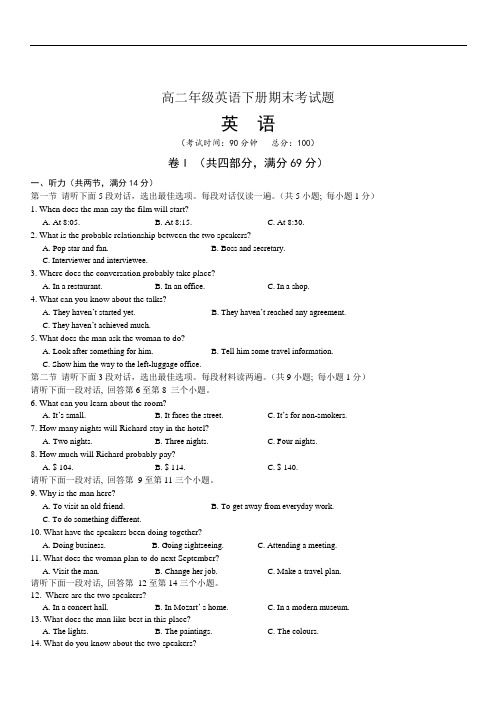
高二年级英语下册期末考试题英语(考试时间:90分钟总分:100)卷I (共四部分,满分69分)一、听力(共两节,满分14分)第一节请听下面5段对话,选出最佳选项。
每段对话仅读一遍。
(共5小题; 每小题1分)1. When does the man say the film will start?A. At 8:05.B. At 8:15.C. At 8:30.2. What is the probable relationship between the two speakers?B. Boss and secretary.A. Pop star and fan.C. Interviewer and interviewee.3. Where does the conversation probably take place?A. In a restaurant.B. In an office.C. In a shop.4. What can you know about the talks?B. They haven’t reached any agreement.A. They haven’t started yet.C. They haven’t achieved much.5. What does the man ask the woman to do?A. Look after something for him.B. Tell him some travel information.C. Show him the way to the left-luggage office.第二节请听下面3段对话,选出最佳选项。
每段材料读两遍。
(共9小题; 每小题1分)请听下面一段对话, 回答第6至第8 三个小题。
6. What can you learn about the room?A. It’s small.B. It faces the street.C. It’s for non-smokers.7. How many nights will Richard stay in the hotel?A. Two nights.B. Three nights.C. Four nights.8. How much will Richard probably pay?A. $ 104.B. $ 114.C. $ 140.请听下面一段对话, 回答第9至第11三个小题。
2019年最新年新 人教版高二英语下册期末试卷 (2)
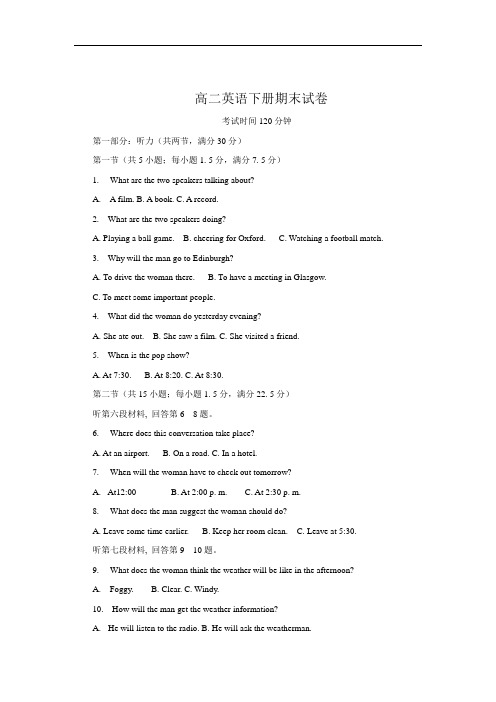
高二英语下册期末试卷考试时间120分钟第一部分:听力(共两节,满分30分)第一节(共5小题;每小题1. 5分,满分7. 5分)1.What are the two speakers talking about?A. A film.B. A book.C. A record.2. What are the two speakers doing?A. Playing a ball game.B. cheering for Oxford.C. Watching a football match.3. Why will the man go to Edinburgh?A. To drive the woman there.B. To have a meeting in Glasgow.C. To meet some important people.4. What did the woman do yesterday evening?A. She ate out.B. She saw a film.C. She visited a friend.5. When is the pop show?A. At 7:30.B. At 8:20.C. At 8:30.第二节(共15小题;每小题1. 5分,满分22. 5分)听第六段材料, 回答第6---8题。
6.Where does this conversation take place?A. At an airport.B. On a road.C. In a hotel.7.When will the woman have to check out tomorrow?A.At12:00B. At 2:00 p. m.C. At 2:30 p. m.8.What does the man suggest the woman should do?A. Leave some time earlier.B. Keep her room clean.C. Leave at 5:30.听第七段材料, 回答第9---10题。
2019学年高二英语下学期期末考试试题(含解析)新人教版

2019年秋季学期期末检测试卷高二英语命题教师:孔丽梅第一部分听力(共两节,满分30分)第一节共5个小题;每小题1.5分,满分7.5分。
听下面5段对话。
每段对话后有一个小题,从题中所给的A、B、C三个选项中选出最佳选项,并标在试卷的相应位置。
听完每段对话后,你都有10秒钟的时间来回答有关小题和阅读下一小题。
每段对话仅读一遍。
1.What does the man want to see?A. A ring.B. A watch.C. A diamond.2. What is the woman going to do this evening?A. Visit her sister.B. Go to the airport.C. Have dinner with the man.3. What's the weather like now?A. Sunny.B. Rainy.C. Snowy.4. How did the woman know about the earthquake?A. From the newspaper.B. From the radio.C. From the TV.5. How does the man probably feel?A. Sorry.B. Upset.C. Relaxed.第二节共15小题,每小1.5分,满分22.5分。
听下面5段对话。
每段对话后有一个小题,从题中所给的A、B、C三个选项中选出最佳选项,并标在试卷的相应位置。
听完每段对话后,你都有10秒钟的时间来回答有关小题和阅读下一小题。
每段对话仅读两遍。
听第6段材料,回答第6、7题。
6. What does the man want?A. Bread.B. Ham.C. Eggs.7. What will the man drink first?A. Milk.B. Coffee.C. Orange juice.听第7段材料,回答第8至10题。
高二英语下学期期末考试试题(含解析)新人教版新版
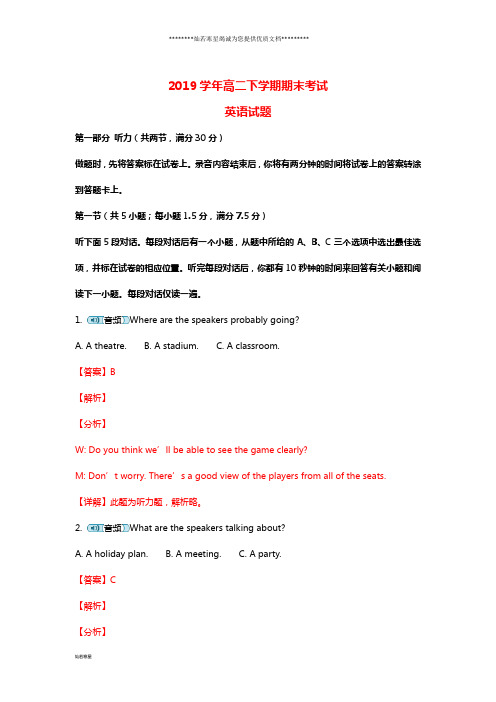
2019学年高二下学期期末考试英语试题第一部分听力(共两节,满分30分)做题时,先将答案标在试卷上。
录音内容结束后,你将有两分钟的时间将试卷上的答案转涂到答题卡上。
第一节(共5小题;每小题1.5分,满分7.5分)听下面5段对话。
每段对话后有一个小题,从题中所给的A、B、C三个选项中选出最佳选项,并标在试卷的相应位置。
听完每段对话后,你都有10秒钟的时间来回答有关小题和阅读下一小题。
每段对话仅读一遍。
1. 音频Where are the speakers probably going?A. A theatre.B. A stadium.C. A classroom.【答案】B【解析】【分析】W: Do you think we’ll be able to see the game clearly?M: Don’t worry. There’s a good view of the players from all of the seats.【详解】此题为听力题,解析略。
2. 音频What are the speakers talking about?A. A holiday plan.B. A meeting.C. A party.【答案】C【解析】【分析】W: Are you having a good time?M: Sure. Thanks again for inviting me.W: No problem. I just wish more people could have come.【详解】此题为听力题,解析略。
3. 音频What will the man do this Saturday?A. Attend a party.B. Visit a friend.C. See a film.【答案】C【解析】【分析】W: What are you doing this Saturday? Lisa invited me to a party and said I could bring a friend.M: I’m going to see a movie with Mike that night. I’m free on Sunday.【详解】此题为听力题,解析略。
2019年最新年新 人教版高二英语下册期末考试卷
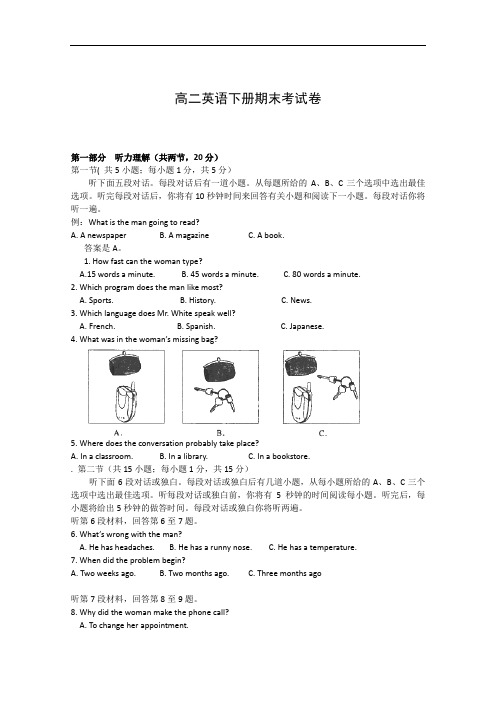
高二英语下册期末考试卷第一部分听力理解(共两节,20分)第一节( 共5小题;每小题1分,共5分)听下面五段对话。
每段对话后有一道小题。
从每题所给的A、B、C三个选项中选出最佳选项。
听完每段对话后,你将有10秒钟时间来回答有关小题和阅读下一小题。
每段对话你将听一遍。
例:What is the man going to read?A. A newspaperB. A magazineC. A book.答案是A。
1. How fast can the woman type?A.15 words a minute.B. 45 words a minute.C. 80 words a minute.2. Which program does the man like most?A. Sports.B. History.C. News.3. Which language does Mr. White speak well?A. French.B. Spanish.C. Japanese.4. What was in the woman’s missing bag?5. Where does the conversation probably take place?A. In a classroom.B. In a library.C. In a bookstore.. 第二节(共15小题;每小题1分,共15分)听下面6段对话或独白。
每段对话或独白后有几道小题,从每小题所给的A、B、C三个选项中选出最佳选项。
听每段对话或独白前,你将有5秒钟的时间阅读每小题。
听完后,每小题将给出5秒钟的做答时间。
每段对话或独白你将听两遍。
听第6段材料,回答第6至7题。
6. What’s wrong with the man?A. He has headaches.B. He has a runny nose.C. He has a temperature.7. When did the problem begin?A. Two weeks ago.B. Two months ago.C. Three months ago听第7段材料,回答第8至9题。
2019年最新年新 人教版高二英语下册期末质量检测题
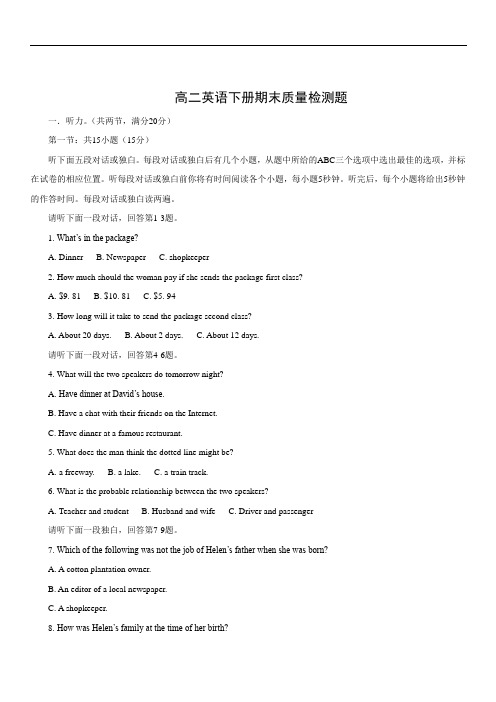
高二英语下册期末质量检测题一.听力。
(共两节,满分20分)第一节:共15小题(15分)听下面五段对话或独白。
每段对话或独白后有几个小题,从题中所给的ABC三个选项中选出最佳的选项,并标在试卷的相应位置。
听每段对话或独白前你将有时间阅读各个小题,每小题5秒钟。
听完后,每个小题将给出5秒钟的作答时间。
每段对话或独白读两遍。
请听下面一段对话,回答第1-3题。
1. What’s in the package?A. DinnerB. NewspaperC. shopkeeper2. How much should the woman pay if she sends the package first class?A. $9. 81B. $10. 81C. $5. 943. How long will it take to send the package second class?A. About 20 days.B. About 2 days.C. About 12 days.请听下面一段对话,回答第4-6题。
4. What will the two speakers do tomorrow night?A. Have dinner at David’s house.B. Have a chat with their friends on the Internet.C. Have dinner at a famous restaurant.5. What does the man think the dotted line might be?A. a freeway.B. a lake.C. a train track.6. What is the probable relationship between the two speakers?A. Teacher and studentB. Husband and wifeC. Driver and passenger请听下面一段独白,回答第7-9题。
2019年新人教版高二英语科第二学期期末考试试题
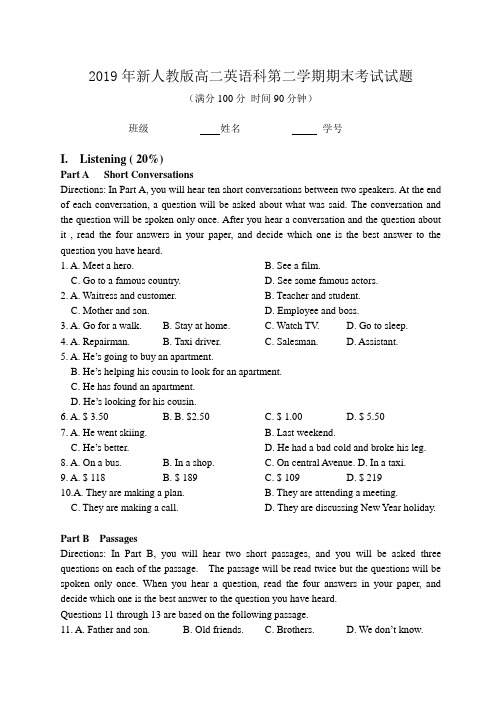
2019年新人教版高二英语科第二学期期末考试试题(满分100分时间90分钟)班级__________ 姓名__________ 学号______I. Listening ( 20%)Part A Short ConversationsDirections: In Part A, you will hear ten short conversations between two speakers. At the end of each conversation, a question will be asked about what was said. The conversation and the question will be spoken only once. After you hear a conversation and the question about it , read the four answers in your paper, and decide which one is the best answer to the question you have heard.1. A. Meet a hero. B. See a film.C. Go to a famous country.D. See some famous actors.2. A. Waitress and customer. B. Teacher and student.C. Mother and son.D. Employee and boss.3. A. Go for a walk. B. Stay at home. C. Watch TV. D. Go to sleep.4. A. Repairman. B. Taxi driver. C. Salesman. D. Assistant.5. A. He’s going to buy an apartment.B. He’s helping his cousin to look for an apartment.C. He has found an apartment.D. He’s looking for his cousin.6. A. $ 3.50 B. B. $2.50 C. $ 1.00 D. $ 5.507. A. He went skiing. B. Last weekend.C. He’s better.D. He had a bad cold and broke his leg.8. A. On a bus. B. In a shop. C. On central Avenue. D. In a taxi.9. A. $ 118 B. $ 189 C. $ 109 D. $ 21910.A. They are making a plan. B. They are attending a meeting.C. They are making a call.D. They are discussing New Year holiday.Part B PassagesDirections: In Part B, you will hear two short passages, and you will be asked three questions on each of the passage. The passage will be read twice but the questions will be spoken only once. When you hear a question, read the four answers in your paper, and decide which one is the best answer to the question you have heard.Questions 11 through 13 are based on the following passage.11. A. Father and son. B. Old friends. C. Brothers. D. We don’t know.12. A. He likes to help the old blind man.B. He likes to show off before others.C. He is richer than the old blind man.D. He lives together with the old blind man.13. A. The young blind man told the time to the old one finally.B. The old blind man didn’t know who wear the watch.C. The young blind man gave the watch to the old one.D. The young blind man was embarrassed.Questions 14 through 16are based on the following passage.14. A. She worked in a factory. B. Her father helped her.C. She worked in a company.D. She made money by giving private lessons.15. A. She is Polish.B. She was the best in her class in the university.C. She entered university soon after she finished middle school.D. She loved science very much.16. A. 3 years. B. 5 years. C. 3.5 years. D. 4 years.Part C Longer conversationDirections: In part C, you will hear a longer conversation. The conversation will be read twice. After you hear the conversation, you are required to fill in the numbered blanks with the information you have heard. Write your answers on your answer sheet.II. Choice (20%)21.The plant is dead. You ____________ it more water.A. will giveB. should have givenC. must giveD. would have given22. He went into the room _______________.A. with a book being in his handB. with a book in his handC. being a book in his handD. a book being in his hand23. -- May I pick a flower in the garden? -- __________________.A. No, you needn’t.B. No, you don’t.C. No, you can’t.D. No, you won’t.24. It is _________ that the book is worth ___________.A. sure; to readB. sure; readingC. certain; readingD. certain; being read25. The manager came up to see ____________.A. what the matter wasB. what was the matterC. what the matter isD. what is the matter26. They have made _________ a rule ___________ in the room.A. this; not to smokeB. it; smoking C. it; to not smoking D. it; not to smoke27. _________ the day went on, the weather got worse.A. AsB. WithC. SinceD. While28. I saw him just now. He ________________ to Beijing.A. can goB. mustn’t have goneC. needn’t have goneD. can’t have gone29. His pale face suggested that he ________ ill.A. beB. would beC. wasD. should be30. I’d like to ask her _______________ come with you.A. if she willB. if will sheC. whether will sheD. will she31. -- “ Would you please do me a favor?” She said to me .-- She asked me _____________.A. do me a favourB. do her a favourC. to do me a favourD. to do her a favour32. _________ the room, he found a letter on the desk..A. Having enteredB. To enterC. EnteringD. Entered33. We doubt ____________ he can finish it well.A. thatB. whetherC. whyD. what34. Your pen is here. That pen __________be yours.A. may notB. can’tC. must notD. will not35. _____________ I got home ________ it began to rain.A. Hardly had… thanB. No sooner had… thanC. No sooner had … whenD. Hardly… when36. He asked his father __________.A. where it happensB. where did it happenC. how it happenedD. how did it happen37. Do you feel like __________ out or would you rather _______ at home?A. going; stayB. to go; to stayC. going; to stayD. to go; staying38. The little boy asked his parents if the moon _________ round the earth.A. movedB. has movedC. movesD. should move39. Thank you for your present. You _________________such an expensive one for me .A. shouldn’t buyB. shouldn’t have boughtC. needn’t have boughtD. can’t have bought40. _____________, we will visit the museum after lunch.A. Time permittingB. Time permitsC. If time permittingD. If time permitIII. Cloze ( 10% )Mark Twain was asked one day if he could remember the first money he ever earned. He thought for a long time __41__ answering and then said, “ Yes, it was at school. I can remember everything about it. School boys in those days didn’t __42__ their teachers and didn’t take good care of the school property. They often had their desks or benches __43__. There was a rule in our school __44__ any boy who damaged his desk with a pencil or a knife should be beaten in front of the whole school, __45__ would have to pay five dollars.”“ One day I damaged my desk __46__ . I had to tell my father I had broken the rule. I had to decide __47__ I would pay five dollars or be punished before the whole school. My father said it would be too __48__ to have our family disgraced(丢面子) in front of the whole school. He agreed to give me five dollars to hand over to the teacher. But before giving me the __49__, he took me upstairs and gave me a beating.“ But as I had had one beating and got used to it, I decided I would take another beating at school and __50__ the five dollars. So that’s what I did. That was the first money I ever earned. ”( ) 41. A. after B. before C. while D. since( ) 42. A. respect B. help C. accept D. inspect( ) 43. A. damaged B. destroying C. moved D. repaired( ) 44. A. which B. what C. that D. where( ) 45. A. or B. and C. so D. but( ) 46. A. in no way B. in the way C. in some way D. by the way( ) 47. A. if B. whether C. that D. which( ) 48. A. bad B. good C. pleased D. dangerous( ) 49. A. beating B. money C. praise D. prize( ) 50. A. change B. make C. keep D. payIV. Reading Comprehension. (15%)( A )Baths and bathing have long been considered of medical importance to man. In Greece there are the ruins(废墟) of a water system(系统) for baths built over 3,000 years ago. The Romans had warm public baths. In some baths, as many 3,000 persons could bathe at the same time.Treating disease by taking bathing has been popular for centuries. Modern medical bathing first became popular in Europe and by the late 1700’s has also become popular in the United States.For many years frequent(经常的) bathing was believed to be bad for one’s health.Ordinary bathing just to keep clean was avoided, and perfume was often used to cover up body smells!By the 1700’s, doctors began to say that soap and water were good for health. They believed that it was good for people to be clean. Slowly, people began to bathe more frequently. During the Victorian Age of the late 19th century, taking a bath on Saturday night became common.In the United States ordinary bathing was slow to become popular. During the 18th and early 19th centuries, many Americans were known as “The Great Unwashed!” In one American city , for example, a person was only allowed to take a bathe every thirty days! That was a law!Frequency of bathing today is partly a matter of habit. People know that bathing for cleanliness is important to health. Doctors know that dirty bodies increase the chance of diseases. As a result, in the United States, people generally bathe often. Some people bathe once a day at least. They consider a daily bath essential to good health.51. A water system for baths was built by ________ over 3,000 years ago.A. the RomansB. the GreeksC. the AmericansD. the Europeans52. Dirty bodies can ____________ .A. ruin one’s businessB. cause diseaseC. drive customers awayD. cause good health53. In the 18th century doctors believed that being clean was __________ .A. unimportantB. good for healthC. harmfulD. important54. The underlined word perfume probably means _________ .A. a sweet smelling substanceB. good healthC. a strange smelling substanceD. large wealth55. Which of the following gives the main idea of the passage?A. Everybody in America takes a daily bath.B. A bath a day keeps the doctor away.C. Taking baths has become popular in the world.D. Bathing has become easier and cheaper.( B )Overhead bridges are found in many parts of Beijing, especially in places where traffic is very heavy and crossing the road is dangerous.The purpose of these bridges is to enable pedestrians (行人) to cross roads safely. Overhead bridges are used to very much the same way as zebra crossings. They are more efficient although less convenient because people have to climb up a long flight of steps. This is inconvenient especially to older people. When pedestrians use an overhead bridge, they do not hold up traffic. However, when they cross a busy road using a zebra crossing,traffic is held up. This is why the government has built many overhead bridges to help pedestrians and to keep traffic moving at the same time.The government of Beijing has spent a large amount of money on building these bridges. For their own safety, pedestrians should be encouraged to use them instead of risking their lives by dashing across the road. Old people , however , may find it a little difficult climbing up and down the steps, but it is still much safer than walking across the road with all the danger of moving traffic.Overhead bridges serve a very useful purpose. Pedestrians, both old and young, should make it a habit to use them. This will prevent unnecessary accidents and loss of life.56. What is the advantage of overhead bridges mentioned in this passage?A. Taller trucks can pass under them.B. Pedestrians can climb up and have a view of the city.C. They are safer for pedestrians and can keep traffic moving at the same time.D. They are easier and more convenient for the pedestrians.57. Why were overhead bridges built in Beijing?A. Because they prevent traffic from being held up.B. Because they provide an easy way for the drivers to cross the road.C. Because they save money for the government.D. Because they save time for the pedestrians.58. Which of the following statements is true according to the passage?A. Overhead bridges are found in every part of Beijing.B. Overhead bridges are only found in the centre of Beijing.C. Overhead bridges can allow cars to pass on them.D. Overhead bridges are found in places where traffic is heavy.59. The underlined words a zebra crossing probably mean ________.A. a safe place across a road for pedestrians to walk across the roadB. a wild animal from Africa that looks like a horse with broad dark brown and whitestripes on its bodyC. a safe place across a road for zebras to walk across the roadD. a safe place across a road for children to play a game60. What is the writer’s attitude towards overhead bridges?A. It is inconvenient to older people to walk across the road.B. It is much safer for pedestrians though climbing up and down the steps may be a little difficult.C. An overhead bridge is more beautiful than a zebra crossing.D. To build overhead bridges is the business of the government.( C )61. _________ In the past, a city’s main shopping place was in its downtown area. Peoplecould get downtown easier than they could get to other parts of the city. Before the 1920s, the best way to travel in a city was on a streetcar, a subway , a railroad , or an elevated train. All these ran on tracks that led downtown.62. _________ As our cities grew outward, people living far from the center of town neededother places to shop. More people were driving cars, and they needed a place they could drive quickly. Driving downtown was difficult. Finding a parking space downtown was sometimes impossible. People also needed a shopping place where they could park easily.63. ________ To meet the shopping needs of people living in the suburbs ,groups ofbusiness moved farther out, too. Today, most suburbs have large shopping centers.64. _________ Modern and well-planned shopping centers are built on large areas of ground.They have even more space for parking than they do for stores. The shopping centers have many different kinds of stores. Often, the shopper can do all his shopping in one place.65. _________ The very large shopping centers have malls which make shopping pleasant.The mall is an area between stores set aside for walking. Shoppers can walk from store to store and enjoy beautiful fountains, statues and plants. There are benches so that shoppers may rest. Some shopping centers have malls with roofs that protect shoppers from the weather outside.V. Complete the following sentences with the correct form of the phrases in the box. ( 5%)66.She ___________ the desire to be a film star.67.The government should ____________ to stop pollution.68.Finally, his dream to become a scientist _____________.69.We should not always ____________ our parents.70.He _____________ Mary about the best place for a holiday.VI. Verb filling. ( 5% )71.The moment he __________ ( come ), I will let you know.72.However, others strongly object to _____________ ( develop) private cars.73.He was caught ______________( cheat ) in the exam.74.The day we were looking forward to ____________( come ) at last.75.The doctor advised me ____________ ( take) more exercise.VII. Translation. ( 15% )1.你如果做错事,应该受惩罚。
2019学年高二英语下学期期末考试试题 最新人教版
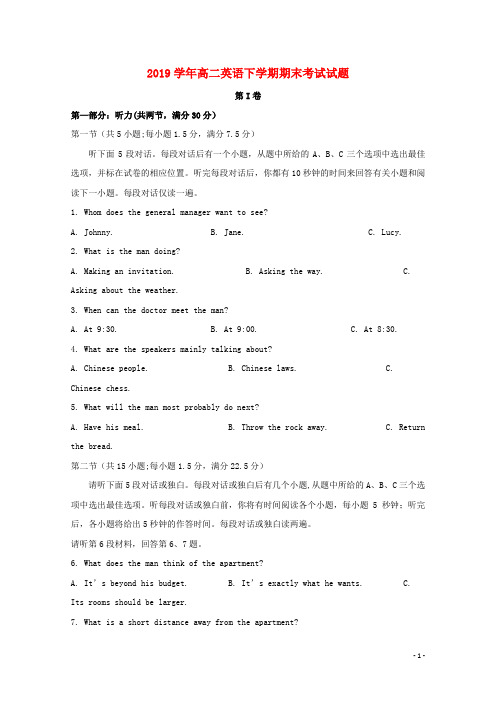
2019学年高二英语下学期期末考试试题第I卷第—部分:听力(共两节,满分30分)第一节(共5小题;每小题1.5分,满分7.5分)听下面5段对话。
每段对话后有一个小题,从题中所给的A、B、C三个选项中选出最佳选项,并标在试卷的相应位置。
听完每段对话后,你都有10秒钟的时间来回答有关小题和阅读下一小题。
每段对话仅读一遍。
1. Whom does the general manager want to see?A. Johnny.B. Jane.C. Lucy.2. What is the man doing?A. Making an invitation.B. Asking the way.C. Asking about the weather.3. When can the doctor meet the man?A. At 9:30.B. At 9:00.C. At 8:30.4. What are the speakers mainly talking about?A. Chinese people.B. Chinese laws.C. Chinese chess.5. What will the man most probably do next?A. Have his meal.B. Throw the rock away.C. Return the bread.第二节(共15小题;每小题1.5分,满分22.5分)请听下面5段对话或独白。
每段对话或独白后有几个小题,从题中所给的A、B、C三个选项中选出最佳选项。
听每段对话或独白前,你将有时间阅读各个小题,每小题5秒钟;听完后,各小题将给出5秒钟的作答时间。
每段对话或独白读两遍。
请听第6段材料,回答第6、7题。
6. What does the man think of the apartment?A. It’s beyond his budget.B. It’s exactly what he wants.C.Its rooms should be larger.7. What is a short distance away from the apartment?A. A hospital.B. A parking lot.C. A park.请听第7段材料,回答第8、9题。
2019学年高二英语下学期期末考试试题 新版新人教版
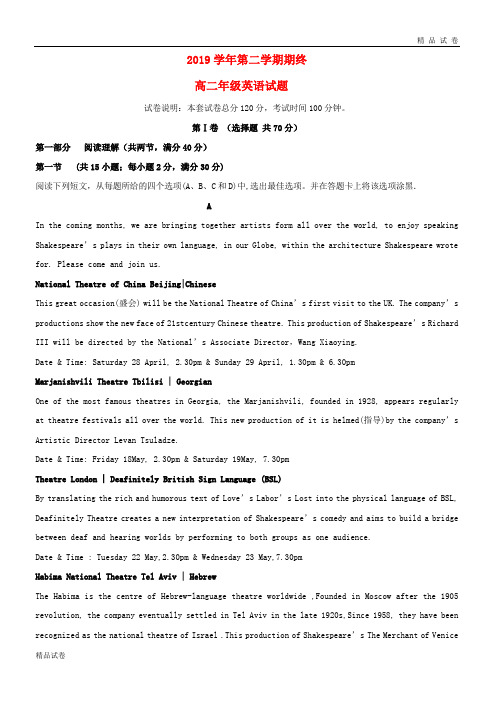
2019学年第二学期期终高二年级英语试题试卷说明:本套试卷总分120分,考试时间100分钟。
第Ⅰ卷(选择题共70分)第一部分阅读理解(共两节,满分40分)第一节 (共15小题;每小题2分,满分30分)阅读下列短文,从每题所给的四个选项(A、B、C和D)中,选出最佳选项。
并在答题卡上将该选项涂黑.AIn the coming months, we are bringing together artists form all over the world, to enjoy speaking Shakespeare’s plays in their own language, in our Globe, within the architecture Shakespeare wrote for. Please come and join us.National Theatre of China Beijing|ChineseThis great occasion(盛会) will be the Nati onal Theatre of China’s first visit to the UK. The company’s productions show the new face of 21stcentury Chinese theatre. This production of Shakespeare’s Richard III will be directed by the National’s Associate Director,Wang Xiaoying.Date & Time: Saturday 28 April, 2.30pm & Sunday 29 April, 1.30pm & 6.30pmMarjanishvili Theatre Tbilisi | GeorgianOne of the most famous theatres in Georgia, the Marjanishvili, founded in 1928, appears regularly at theatre festivals all over the world. This new production of it is helmed(指导)by the company’s Artistic Director Levan Tsuladze.Date & Time: Friday 18May, 2.30pm & Saturday 19May, 7.30pmTheatre London | Deafinitely British Sign Language (BSL)By translating the rich and humorous text of Love’s Labor’s Lost into t he physical language of BSL, Deafinitely Theatre creates a new interpretation of Shakespeare’s comedy and aims to build a bridge between deaf and hearing worlds by performing to both groups as one audience.Date & Time : Tuesday 22 May,2.30pm & Wednesday 23 May,7.30pmHabima National Theatre Tel Aviv | HebrewThe Habima is the centre of Hebrew-language theatre worldwide ,Founded in Moscow after the 1905 revolution, the company eventually settled in Tel Aviv in the late 1920s,Since 1958, they have been recog nized as the national theatre of Israel .This production of Shakespeare’s The Merchant of Venicemarks their first visit to the UK.Date & Time: Monday 28May, 7.30 & Tuesday 29 May, 7.30pm1.which play will be performed by the National Theatre of China?A. Lover’s Labour’s LostB. Richard Ⅲ.C. As You Like ItD. The Merchant of Venice2.What is special about Deafinitely Theatre?A. It has two groups of actorsB. It is the leading theatre in LondonC. It is good at producing comediesD. It performs plays in BSL3.When can you see a play in Hebrew?A. On Saturday 28 April.B. On Sunday 29 AprilC. On Tuesday 29 MayD. On Tuesday 22 May.BWhen 19-year-old Sophia Giorgi said she was thinking of volunteering to help the Make-A-Wish Foundation (基金会),nobody understood what she was talking about. But Sophia knew just how important Make –A –Wish could , because this special organization had helped to make a dream come true for one her best friends. We were interested in finding out more, so we went along to meet Sophia to listen to what she had to say.Sophia told us that Make – A –Wish is a worldwide organization that started in the United States in 1980. ” It’s a charity(慈善机构)that helps children who have got very serious illnesses. Make – A –Wish help child ren feel happy even though they are sick, by making their wishes and dreams come true,” Sophia explained.We asked Sophia how Make – A –Wish had first started. She said it had all begun with a very sick young boy called Chris, who had been dreaming for a long time of becoming a policeman. Sophia said lots of people had wanted to find a way to make Chris’s dream come true ----so, with everybody’s help, Chris, only seven years old at the time, had been a “policeman” for a day. ” when people saw how delighted Chris was when his dream came true, they decided to try and help other sick children too , and that was the beginning of Make – A –Wish, ” explained Sophia.Sophia also told us the Foundation tries to give children and their families a special, happy time.A Make-A-Wish volunteer visits the families and asks the children what they would wish for if they could have anything in the world. Sophia said the volunteers were important because they were the ones who helped to make the wishes come true. They do this either by providing things that are necessary, or by raising money or helping out in whatever way they can4. Sophia found out about Make-A-Wish because her best friend had__________ .A. volunteered to help itB. benefited from itC. dreamed about itD. told the author about it5. According to Sophia, Make-A-Wish ____________ .A. raises money for very poor familiesB. was understood by nobody at firstC. is an international charityD. started by drawing the interest of the public6. What is said about Chris in Paragraph3?A .He has been a policeman since he was sevenB .He wanted people to help make his dream come trueC. He gave people the idea of starting Make-A-WishD .He was the first child Make-A-Wish helped after it had been set up7 Which of the following is true about Make-A-Wish volunteers?A. They provide what is necessary to make Make-A-Wish popularB. They try to help children get over their illnessesC. They visit sick children to make them feel specialD. They are important for making wishes come trueCWe live in a digital world now, and a student’s technology needs have changed. For the early years, when you are in primary school, you can get by with no technology at all. Even if you have a computer, it’s a good idea to get children familiar with libraries. At this age, trips to the library are like family outings.As you get closer to middle school, a computer with Internet access becomes more of a necessity. Teachers will often give assignments that require a student to use the Internet for research. After a computer, technology choices for students become more difficult to make –especially when it comes to cell-phones. Kids will beg their parents for a cell-phone, especially in middle school. For many parents, it’s a safety issue: They want to know that their kids can reach them quickly if necessary. For teachers, cell phones can be used to record lessons when students are absent. But many teachers dislike cell-phones. Some kids send messages or have talks in the class. Sending messages also raises the problem of cheating on exams. More and more schools are now forbidding the use of cell-phones. Many kids see iPods as necessary things to have. IPods are great for music, but do they do anything good for your children’s education? May be they do. That’s the opinion of Doug Johnson, an educatorfor 30 years. Johnson says that educators should accept all new forms of technology in the classroom, including iPods. “Some do more with their cell- phones than we can do with our laptops,” he jo kes. “I don’t think we should be afraid. The truth is that it’s easier to change the way we teach than to change the technology habits of an entire generation.”8. According to author, primary school children should___.A.Use the computer and the Internet regularlyB.Ask their parents to buy them cell-phonesC.Buy iPods to listen to music D.Go to libraries to read more books9. Why do parents agree to buy their children cell-phones?A.They want their children to be cool.B.They think cell-phones be helpful to their studyC They want to keep in touch with their children.D.They want their children to keep up to date.10 .The following are all reasons why many teachers dislike cell-phones EXCEPT ____.A.Cell-phones can be used to cheat on examsB.Schoolchildren will send messages during classC.Cell-phones can be used to record lessonsD.Schoolchildren might talk on them during class11.What does the underlined word “that” refers to?A.IPods can be used to listen to music. B.iPods can be helpful for children’s education. C.IPods can be used to play games. D.iPods are necessary for children’s lives.12. We can infer from what Doug Johnson said that _____.A.Cell-phones are not useful to studentsB.Teacher s should let students use cell-phonesC.it’s better for teachers to change their teaching methodsD.schoolchildren should follow the trends(潮流) of fashion题DHere comes a story that many years ago a man arrived at a village in India to catch monkeys so he could sell them to zoos.The monkeys,however,were very clever and every sort of trap he set failed.A young boy watched the man's pathetic efforts and laughed.The man said,"If you can catch me a monkey,I'll give you﹩2.That was a huge amount of money then.The boy went to his home and took a clay pot with a narrow neck.He placed a few nuts around the pot and put lots of nuts inside.He then tied the pot to a tree and told the man,"We should have a rest in a few hours.Let's wait in the village.The monkey will call us when he is ready."Certainly enough,a band of monkeys soon discovered the nuts and the pot.One slipped his hand in the pot and grabbed a handful of nuts,but he couldn't pull his hand out of the narrow opening of the pot because his fist(拳头) was clenched.The monkey feared and started making loud noises.Some of the other monkeys tried unsuccessfully to pull the pot off his hand.The boy and the man heard the noises and the boy got a big strong bag.As they approached the monkeys they all ran away except the one with its hand in the pot.The boy grabbed the monkey and the pot.The man was amazed and asked the boy the secret of his monkey trap,"Why was it so easy for the monkey to get his hand in but so hard to get it out?"The boy laughed and said,"The monkey could have easily got his hand back out and escaped,but he would have had to let go of the nuts in the pot and he just wasn't willing to let go.They never are."What lessons can be learned from this story?Do people sometimes trap themselves by holding onto things that they should let go?Do you?13.Why couldn't the monkey pull his hand out of the pot?The reason lies in __________A.the pot's neck was too narrow B.the monkey wouldn't let go of the nutsC.the monkey's fist was too big D.the nuts in the pot were too delicious14.Which of the statement is NOT true according to the story?A.The boy just played a trick on the man.B.The monkeys were too clever to be trapped.C.The boy was helpful.D.The boy could ask for﹩2 from the man.15.What might be the best title of this passage?A.the monkey and the boy B.the boy and the potC.the monkey and the pot D.the man and the pot.第二节(共5小题;每小题2分,满分10分)根据短文内容,从短文后的选项中选出能填入空白处的最佳选项。
最新人教版2019学年高二英语下学期期末考试试题
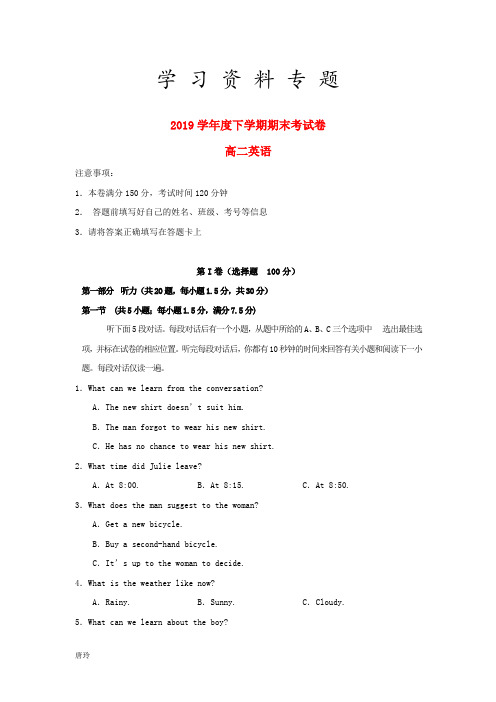
学习资料专题2019学年度下学期期末考试卷高二英语注意事项:1.本卷满分150分,考试时间120分钟2.答题前填写好自己的姓名、班级、考号等信息3.请将答案正确填写在答题卡上第I卷(选择题 100分)第一部分听力(共20题,每小题1.5分,共30分)第一节(共5小题;每小题1.5分,满分7.5分)听下面5段对话。
每段对话后有一个小题,从题中所给的A、B、C三个选项中选出最佳选项,并标在试卷的相应位置。
听完每段对话后,你都有10秒钟的时间来回答有关小题和阅读下一小题。
每段对话仅读一遍。
1.What can we learn from the conversation?A.The new shirt doesn’t suit him.B.The man forgot to wear his new shirt.C.He has no chance to wear his new shirt.2.What time did Julie leave?A.At 8:00. B.At 8:15. C.At 8:50.3.What does the man suggest to the woman?A.Get a new bicycle.B.Buy a second-hand bicycle.C.It’s up to the woman to decide.4.What is the weather like now?A.Rainy. B.Sunny. C.Cloudy.5.What can we learn about the boy?A.He got the part he tried out for.B.He did’t want to get a role on the play.C.He failed to get the part but wasn’t discouraged.第二节(共15小题;每题1.5分,满分22.5分)听下面5段对话或独白。
2019年最新年新 人教版高二英语第二学期期末考试试卷
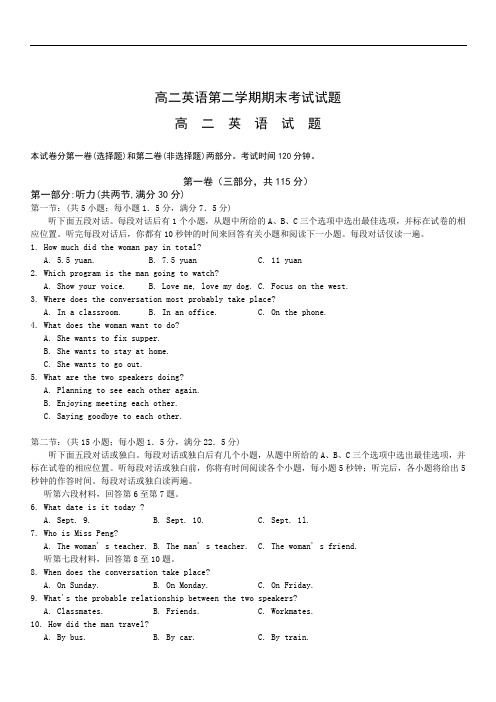
高二英语第二学期期末考试试题高二英语试题本试卷分第一卷(选择题)和第二卷(非选择题)两部分。
考试时间120分钟。
第一卷(三部分,共115分)第一部分:听力(共两节,满分30分)第一节:(共5小题;每小题1.5分,满分7.5分)听下面五段对话。
每段对话后有1个小题,从题中所给的A、B、C三个选项中选出最佳选项,并标在试卷的相应位置。
听完每段对话后,你都有10秒钟的时间来回答有关小题和阅读下一小题。
每段对话仅读一遍。
1. How much did the woman pay in total?A. 5.5 yuan.B. 7.5 yuanC. 11 yuan2. Which program is the man going to watch?A. Show your voice.B. Love me, love my dog.C. Focus on the west.3. Where does the conversation most probably take place?A. In a classroom.B. In an office.C. On the phone.4. What does the woman want to do?A. She wants to fix supper.B. She wants to stay at home.C. She wants to go out.5. What are the two speakers doing?A. Planning to see each other again.B. Enjoying meeting each other.C. Saying goodbye to each other.第二节:(共15小题;每小题1.5分,满分22.5分)听下面五段对话或独白。
每段对话或独白后有几个小题,从题中所给的A、B、C三个选项中选出最佳选项,并标在试卷的相应位置。
2019学年高二英语下学期期末考试试题(新版)新人教版

2019学年度第二学期期末考试高二英语注意事项:1.本试卷由四个部分组成。
其中,第一、二部分和第三部分的第一节为选择题。
第三部分的第二节和第四部分为非选择题。
2.答卷前,考生务必将自己的姓名、准考证号填写在答题卡上。
3.回答选择题时,选出每小题答案后,用2B 铅笔把答题卡上对应题目的答案标号涂黑;回答非选择题时,将答案写在答题卡上,写在本试卷上无效。
4.考试结束后,将本试卷和答题卡一并交回。
第一部分听力(共两节,满分30分)第一节(共5小题;每小题1.5分,满分7.5分)听下面5段对话。
每段对话后有一个小题,从题中所给的A、B、C三个选项中选出最佳选项,并标在试卷的相应位置。
听完每段对话后,你都有10秒钟的时间来回答有关小题和阅读下一小题。
每段对话仅读一遍。
例:How much is the shirt?A. £19.15B. £9.18C. £9.15答案是C。
1. What are the speakers doing?A. Fishing.B. Hiking.C. Swimming.2. What is the man trying to do?A. Introduce famous actors.B. Buy some medicine.C. Sell a skin cream.3. How much is the change?A. $6.B. $4.C. $1.4. Where was the woman’s car made?A. In China.B. In America.C. In Japan.5. Where does the conversation take place?A. At home.B. In a concert hall.C. In a KTV.第二节(共15小题;每小题1.5分,满分22.5分)听下面5段对话或独白。
每段对话或独白后有几个小题,从题中所给的A、B、C三个选项中选出最佳选项,并标在试卷的相应位置。
2019年最新年新 人教版高二年级英语下册期末试卷

高二年级英语下册期末试卷(说明:考试时间:100分钟满分:120分)第一部分:听力(共15小题,满分15 分)听第6段材料,回答第6至8题。
1.(6) Where does the woman want to go next Sunday?A. The school.B. The zoo.C. The man’s home.2.(7) How will the two speakers get there?A.By bike.B.By bus.C.By taxi3.(8)Who will go with the two speakers?A. Jim.B. Sam.C. Mary.听第7段材料,回答第9至11题。
4.(9)Where is the woman now?A. In France.B. In China .C. In England .5.(10) Why did the woman’s family move to France?A. She wanted to study there.B. Her father found work there.C. Her hometown was too small.6. (11) What language is the woman learning now?A. French.B. Chinese.C. Japanese.听第8段材料,回答第12至14题。
7. (12) What does the man recommend the woman to buy?A. Bread .B. Salad .C. Tomatoes.8. (13) When will the shop have cabbage?A.This afternoon.B.Tomorrow .C.Tonight.9. (14) What does the woman want to make with the cabbage?A.Soup.B. Salad.C. Sandwiches.听第9段材料,回答第15至17题。
2019年最新年新 人教版高二英语下册期末质量评估试题

高二英语下册期末质量评估试题(英语)第一部分:听力(共两节,满分20分)第一节(共5小题;每小题1分,满分5分)听下面5段对话。
每段对话后有一个小题,从题中所给的A、B、C三个选项中选出最佳选项,并标在试卷的相应位置。
听完每段对话后,你都有10秒钟的时间来回答有关小题和阅读下一小题。
每段对话仅读一遍。
1.What does the man think of his experience of doing fieldwork?A. Extremely valuableB. Nothing specialC. Quite boring2. What does the woman mean?A. She couldn’t agree more with the man.B. Electronic cards and letters are more efficient.C. She doesn’t like electronic cards and letters.3. What do we learn from the conversation?A. The man is bored with his homework.B. The woman is not good at cooking.C. The man wants a change for food.4. What do we learn about the woman?A. She doesn’t like coffee.B. She likes reading.C. She likes sunny days best.5. Where does the conversation probably take place?A. At an airport.B. At a train station.C. At a ticket office.第二节(共15小题;每题1分,满分15分)听下面6段对话或独白。
2019年最新年新 人教版高二英语下册期末质量检测题 (4)

高二英语下册期末质量检测题英语第Ⅰ卷(三部分,共115分)第一部分听力(共两节,满分30分)第一节(共5小题;每小题1.5分,满分7.5分)听下面5段对话,每段对话仅读一遍。
1. How much will the man pay if he wants two shirts?A. 35 dollarsB. 60 dollarsC. 70 dollars2. Where are the speakers?A. In the restaurant.B. At a shop.C. In the bookstore.3. What can you infer from the conversation?A. The woman is eager to rest in some place.B. The man is fond of maps.C. The speakers have little money with them.4. What does the woman think of her job in the travel agency?A. Terrible.B. Great.C. Shocking.5. What does the man wish to do?A. Avoid the rush hour.B. Go to a park.C. Park his car.第二节(共15小题,每小题1.5分,满分22.5分)听下面5段对话或独白,每段对话读两遍。
请听第6段材料,回答第6至8题。
6. What are the speakers talking about?A. Fathe r’s hobbies.B. Birthday gifts.C. money saving.7. What will the man buy for his father?A. A new bike.B. Some wine.C. An air conditioner.8. What season is it now?A. Spring.B. Summer.C. Autumn.请听第7段材料,回答第9至11题。
2019年最新年新 人教版高二英语下册期末质量检测题 (2)

高二英语下册期末质量检测题高二年级英语科试卷本试卷分第一卷(选择题)和第二卷(非选择题)两部分第一卷(三部分共115分)第一部分:听力理解(共两小节,满分30分)第一节(共5小题,每小题1.5分,满分7.5分)听下面5段对话,每段对话后有一个小题,从题中所给的A,B,C三个选项中选出最佳选项,并标在试卷的相应位置。
听完每段对话后,你将有10秒钟的时间来回答有关小题和阅读下一小题。
每段对话仅读一遍。
1. why is the woman feeling worried?A.Because she couldn’t buy a new shirt.B. Because she dirtied the man’s new shirt.C. Because she was not able to wash the shirt.2. When will the woman clean the room?A. In about half an hour.B. In an hour.C. In an hour and a half.3. What are the two speakers doing?A. Making coffee.B. Cleaning the house.C. Repairing the vacuum cleaner.4. How does the man fee?A. He is worried.B. He is sad.C. He feels confident5. What will the man probably to next?A. Show the woman the way to the library.B. Return the books for the woman.C. Help the woman with the paper.第二节(共15小题,每小题1.5分,满分22.5分)听下面5段对话或独白。
2019年最新年新 人教版高二英语下册期末调研考试题
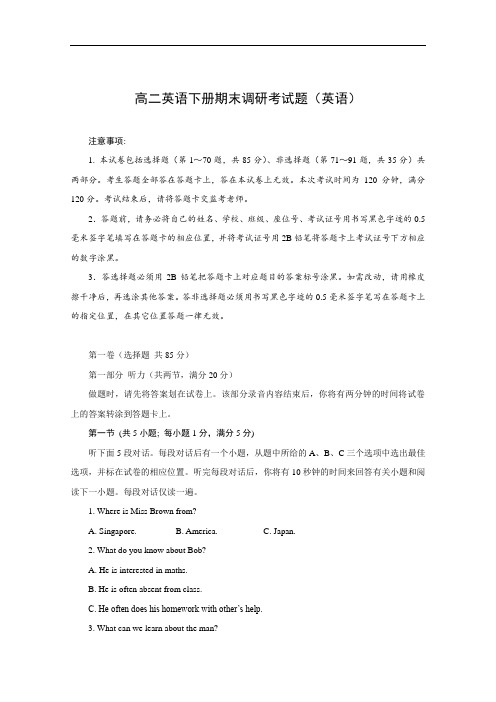
高二英语下册期末调研考试题(英语)注意事项:1. 本试卷包括选择题(第1~70题,共85分)、非选择题(第71~91题,共35分)共两部分。
考生答题全部答在答题卡上,答在本试卷上无效。
本次考试时间为120分钟,满分120分。
考试结束后,请将答题卡交监考老师。
2.答题前,请务必将自己的姓名、学校、班级、座位号、考试证号用书写黑色字迹的0.5毫米签字笔填写在答题卡的相应位置,并将考试证号用2B铅笔将答题卡上考试证号下方相应的数字涂黑。
3.答选择题必须用2B铅笔把答题卡上对应题目的答案标号涂黑。
如需改动,请用橡皮擦干净后,再选涂其他答案。
答非选择题必须用书写黑色字迹的0.5毫米签字笔写在答题卡上的指定位置,在其它位置答题一律无效。
第一卷(选择题共85分)第一部分听力(共两节,满分20分)做题时,请先将答案划在试卷上。
该部分录音内容结束后,你将有两分钟的时间将试卷上的答案转涂到答题卡上。
第一节(共5小题; 每小题1分,满分5分)听下面5段对话。
每段对话后有一个小题,从题中所给的A、B、C三个选项中选出最佳选项,并标在试卷的相应位置。
听完每段对话后,你将有10秒钟的时间来回答有关小题和阅读下一小题。
每段对话仅读一遍。
1. Where is Miss Brown from?A. Singapore.B. America.C. Japan.2. What do you know about Bob?A. He is interested in maths.B. He is often absent from class.C. He often does his homework with other’s help.3. What can we learn about the man?A. He couldn’t ride a bike.B. He used to have a bike.C. He would like to have a bike.4. What is the woman going to do?A. Mail an invitation to the Smiths.B. Invite Alan to the party.C. Visit the Smiths.5. Where does the conversation most probably take place?A. At a meeting.B. In a school.C. At a party.第二节(共15小题;每小题1分,满分15分)听下面5段对话或独白。
- 1、下载文档前请自行甄别文档内容的完整性,平台不提供额外的编辑、内容补充、找答案等附加服务。
- 2、"仅部分预览"的文档,不可在线预览部分如存在完整性等问题,可反馈申请退款(可完整预览的文档不适用该条件!)。
- 3、如文档侵犯您的权益,请联系客服反馈,我们会尽快为您处理(人工客服工作时间:9:00-18:30)。
高二英语第二学期期末评价试题高二英语本份试卷共四大部分,共12页,满分150分,考试用时120分钟。
注意事项:1.答卷前,考生务必将自己的姓名、考试证号、考试科目用铅笔涂写在答题卡上。
2.每小题选出答案后,用铅笔把答题卡上对应题目的答案标号涂黑。
如需改动,用橡皮擦干净后,再选涂其他答案标号。
不能答在试卷上。
部分题型答案要求誊写到答题卷上。
3.考试结束,考生将本试卷和答题卡一并交回。
第一部分听力(共两节,满分35分)做题时,先将答案划在试卷上,录音结束后,你将有两分钟的时间将试卷上的答案转涂到答题卡(卷)上。
第一节听对话或独白(共15小题,每小题2分,满分30分)听下面5段对话。
每段对话后有几个小题,从题中所给的A、B、C三个选项中选出最佳选项,并标在试卷的相应位置。
听每段对话前,你将有时间阅读各个小题,每小题5秒钟;听完后,各个小题将给出5秒钟的作答时间。
每段对话或独白读两遍。
(请将该部分答案转涂到答题卡上)听第1段材料,回答第1—3题。
1. What is the man going to do?A. To visit the theatre.B. To see Shakespeare's play.C. To take a long walk with the woman.2. Where do the two speakers probably come from?A. One is from England and the other is from France.B. They both come from England.C. Both of them are from France.3. What will the man probably do in the end?A. Go to the theatre on foot.B. Go to a talk about Shakespeare.C. Take a taxi with the woman.听第2段材料,回答第4—6题。
4. According to the dialogue, why does the woman call the man?A. She wants the man to give her son piano lessons.B. She wants to pick up her skill of playing the piano.C. She wants the man to teach her how to play the guitar.5. What musical experience does the woman have?A. She studied the piano six years ago.B. She studied the guitar for three months.C. She doesn’t have any.6. Which lesson does the woman want to come to?A. A group class on Monday.B. A group class on Wednesday.C. A private lesson on Tuesday.听第3段材料,回答第7—9题。
7.Where does Henry work?A.On a train to London.B.In an office in London.C.At a club outside London.8.When does Henry get up every day?A.At 6:30. B.After 6:30. C.Before 6:30.9.How did Henry use to feel about the time spent on the train?A.A waste of time.B.An enjoyable time.C.A relaxing time.听第4段材料,回答第10—12题。
10.What are the high temperatures for most of the state on Friday?A.85 to 90 degreesB.91 to 95 degreesC.96 to 99degrees11.What is Saturday evening’s weather forecast for the state?A.Light showers over the entire state.B.Cold and windy over the state.C.Some rain in parts of the state.12.What can be done on Sunday evening?A.Appreciating the moon.B.Watching the star shower.C.Collecting rocks and metals.听第5段材料,回答第13—15题。
13. What are they mainly talking about?A. Holidays spent with their friends.B. Summer holiday plan.C. Travel experiences.14. What does the woman prefer to do on holidays?A. Stay in a friend's cottage in the country.B. Visit theatres and cinemas.C. Enjoy beautiful scenery and fresh air.15. What is the woman's decision?A. To go with the man.B. To stay at home.C. To visit her friends in Paris.第二节听取信息(共5小题,每小题1分,满分5分)听下面一段独白。
请根据题目要求,从所给的内容中获取必要的信息,填入答题卷标号为16—20的空格中。
录音读两遍。
你有90秒钟的作答时间。
(请将该部分答案转写在答题纸标号16—20的对应位置)第二部分英语知识应用(共两节,满分35分)第一节完形填空(共15小题,每小题2分,满分20分)阅读下面短文,从短文后所给各题的四个选项(A、B、C、D)中选出能填入空白处的最佳选项。
At the beginning of this century, medical scientists made an interesting discovery; we are built not just of flesh and blood but also of time. They were 21 to show that we all have “a body clock” inside us, which controls the 22 and fall of our body energies, making us different from one day one to the next.The idea of “a body clock” should not be too 23 since the lives of most living things are controlled by the 24 hour night-and-day cycle. We feel tired and fall asleep at night and become 24 and energetic during the day. If the 24 hour-cycle is 25 , most people experience unpleasant feelings . For example, people who are not 26 to working at night can find that 27 of sleep causes them to 28 badly at work.As well as the daily cycle of sleeping and waking, we also have other cycles which 29 longer than one day. Most of us would agree that we feel good on some days and not so good on others ; sometimes our ideas seem to flow and at other times, they 30 do not exist. 21.A.anxious B.able C.careful D.proud 22.A.movement B.supply C.use D.rise 23.A.difficult B.exciting C.surprising D.interesting 24.A.regular B.excited C.lively D.clear 25.A.disturbed B.shortened C.reset D.troubled 26.A.prevented B.allowed C.expected D.used 27.A.miss B.none C.lack D.need 28.A.perform B.show C.manage D.control 29.A.repeat B.remain C.last D.happen 30.A.just B.only C.still D.yet第二节语法填空(共10小题,每题1.5分,共15分)仔细阅读下面短文,短文中有10个空格。
请按照语境以及括号里的具体要求完成语法填空、词形变化等。
答案填写在答题卷标号31—40的对应位置。
Elizabeth Blackwell was born in England in 1821, and moved to New York City when she was ten years old. One day she decided that she wanted to become a doctor. That was __31__(near) impossible for a woman in the middle of the nineteenth century. After writing many letters32 (ask)for admission to medical schools, she was finally accepted by a doctor in Philadelphia. She was so determined33 she taught school and gave music lessons to get 34 for the cost of schooling.In 1849, after graduation from medical school, she decided to go to Paris for her 35 (far)education. She wanted to be a surgeon(外科医师) ,36 a serious eye problem forced her to give up the idea.37 his return to the United States, she found 38 difficult to start her own 39 because she was a woman. By 1857 Elizabeth and her sister, also a doctor, along with another woman doctor, 40 (mange) to open a new hospital, the first for women and children Besides being the first woman physician and founding her own hospital , she also set up the first medical school for women.第三部分阅读(共两节,满分40分)第一节阅读理解(共15小题,每小题2分,满分30分)阅读下列三篇短文,从每题所给的四个选现(A、B、C和D)中,选出最佳选项,并在答题卡上将该项涂黑。
